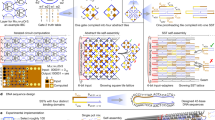Abstract
For robust molecular implementation of tile-based algorithmic self-assembly, methods for reducing errors must be developed. Previous studies suggested that by control of physical conditions, such as temperature and the concentration of tiles, errors (ε) can be reduced to an arbitrarily low rate – but at the cost of reduced speed (r) for the self-assembly process. For tile sets directly implementing blocked cellular automata, it was shown that r ≈ βε 2 was optimal. Here, we show that an improved construction, which we refer to as proofreading tile sets, can in principle exploit the cooperativity of tile assembly reactions to dramatically improve the scaling behavior to r ≈ βε and better. This suggests that existing DNA-based molecular tile approaches may be improved to produce macroscopic algorithmic crystals with few errors. Generalizations and limitations of the proofreading tile set construction are discussed.
Access this chapter
Tax calculation will be finalised at checkout
Purchases are for personal use only
Preview
Unable to display preview. Download preview PDF.
Similar content being viewed by others
References
Adleman, L.M.: Molecular computation of solutions to combinatorial problems. Science 266, 1021–1024 (1994)
Bar-Ziv, R., Libchaber, A.: Effects of DNA sequence and structure on binding of RecA to single-stranded DNA. Proc. Nat. Acad. Sci. USA 98(16), 9068–9073 (2001)
Bar-Ziv, R., Tlusty, T., Libchaber, A.: Protein-DNA computation by stochastic assembly cascade. Proc. Nat. Acad. Sci. USA 99(18), 11589–11592 (2002)
Bloomfield, V.A., Crothers, D.M., Tinoco Jr., I.: Nucleic Acids: Structures, Properties, and Functions. University Science Books (2000)
Bondarenko, B.A.: Generalized Pascal Triangles and Pyramids, Their Fractals, Graphs and Applications. In: Bollinger, R.C. (ed.) The Fibonacci Association (1993) (Translated from the Russian)
Chen, H.-L., Cheng, Q., Goel, A., deh Huang, M., de Espanés, P.M.: Invadable self-assembly: Combining robustness with efficiency. In: ACM-SIAM Symposium on Discrete Algorithms, SODA (2004) (to appear)
Chen, J., Reif, J. (eds.): DNA Computing 9. Springer, Berlin (to appear)
Cook, M., Rothemund, P.W.K., Winfree, E.: Self-assembled circuit patterns. In: Chen and Reif [7]
Fu, T.-J., Seeman, N.C.: DNA double-crossover molecules. Biochemistry 32, 3211–3220 (1993)
Gács, P.: Reliable cellular automata with self-organization. Journal of Statistical Physics 103(1/2), 45–267 (2001)
LaBean, T.H., Yan, H., Kopatsch, J., Liu, F., Winfree, E., Reif, J.H., Seeman, N.C.: Construction, analysis, ligation, and self-assembly of DNA triple crossover complexes. Journal of the American Chemical Society 122, 1848–1860 (2000)
Lagoudakis, M.G., LaBean, T.H.: 2-D DNA self-assembly for satisfiability. In: Winfree, E., Gifford, D.K. (eds.) DNA Based Computers V. DIMACS, vol. 54, pp. 141–154. American Mathematical Society, Providence (2000)
Mao, C., LaBean, T.H., Reif, J.H., Seeman, N.C.: Logical computation using algorithmic self-assembly of DNA triple-crossover molecules. Nature 407(6803), 493–496 (2000)
Mao, C., Sun, W., Seeman, N.C.: Designed two-dimensional DNA Holliday junction arrays visualized by atomic force microscopy. Journal of the American Chemical Society 121(23), 5437–5443 (1999)
Pippenger, N.: Developments in the synthesis of reliable organisms from unreliable components. In: The Legacy of John von Neumann, pp. 311–324. American Mathematical Society, Providence (1990)
Ptashne, M.: A Genetic Switch, 2nd edn. Cell Press & Blackwell (1992)
Reif, J.: Compact error-resilient computational DNA tiling assemblies (unpublished manuscript)
Reif, J.: Local parallel biomolecular computing. In: Rubin, H., Wood, D.H. (eds.) DNA Based Computers III. DIMACS, vol. 48, pp. 217–254. American Mathematical Society, Providence (1999)
Rothemund, P.W.K., Winfree, E.: Algorithmic self-assembly of DNA Sierpinski triangles (in preparation)
Rothemund, P.W.K., Winfree, E.: The program-size complexity of self-assembled squares. In: Symposium on Theory of Computing (STOC), ACM, New York (2000)
Schulman, R., Lee, S., Papadakis, N., Winfree, E.: One dimensional boundaries for DNA tile assembly. In: Chen and Reif [7]
Schulman, R., Winfree, E.: Controlling nucleation rates in algorithmic self-assembly (in preparation)
Soloveichik, D., Winfree, E.: Complexity of self-assembled scale-invariant shapes (Submitted)
von Neumann, J.: Probabilistic logics and the synthesis of reliable organisms from unreliable components. In: Shannon, C.E., McCarthy, J. (eds.) Automata Studies, pp. 43–98. Princeton University Press, Princeton (1956)
Wang, H.: Proving theorems by pattern recognition. II. Bell System Technical Journal 40, 1–42 (1961)
Wang, H.: Dominoes and the AEA case of the decision problem. In: Fox, J. (ed.) Proceedings of the Symposium on the Mathematical Theory of Automata, pp. 23–55. Polytechnic Press, Brooklyn (1963)
Winfree, E.: On the computational power of DNA annealing and ligation. In: Lipton, R.J., Baum, E.B. (eds.) DNA Based Computers. DIMACS, vol. 27, pp. 199–221. American Mathematical Society, Providence (1996)
Winfree, E.: Simulations of computing by self-assembly. Technical Report CSTR: 1998.22, Caltech (1998)
Winfree, E., Liu, F., Wenzler, L.A., Seeman, N.C.: Design and self-assembly of two-dimensional DNA crystals. Nature 394, 539–544 (1998)
Winfree, E., Yang, X., Seeman, N.C.: Universal computation via self-assembly of DNA: Some theory and experiments. In: Landweber, L.F., Baum, E.B. (eds.) DNA Based Computers II. DIMACS, vol. 44, pp. 191–213. American Mathematical Society, Providence (1998)
Yan, H., Park, S.H., Finkelstein, G., Reif, J.H., LaBean, T.H.: DNA-templated self-assembly of protein arrays and highly conductive nanowires. Science 301, 1882–1884 (2003)
Author information
Authors and Affiliations
Editor information
Editors and Affiliations
Rights and permissions
Copyright information
© 2004 Springer-Verlag Berlin Heidelberg
About this paper
Cite this paper
Winfree, E., Bekbolatov, R. (2004). Proofreading Tile Sets: Error Correction for Algorithmic Self-Assembly. In: Chen, J., Reif, J. (eds) DNA Computing. DNA 2003. Lecture Notes in Computer Science, vol 2943. Springer, Berlin, Heidelberg. https://doi.org/10.1007/978-3-540-24628-2_13
Download citation
DOI: https://doi.org/10.1007/978-3-540-24628-2_13
Publisher Name: Springer, Berlin, Heidelberg
Print ISBN: 978-3-540-20930-0
Online ISBN: 978-3-540-24628-2
eBook Packages: Springer Book Archive




